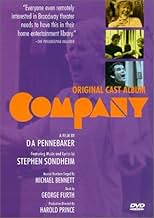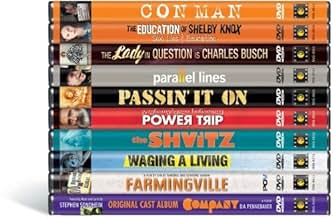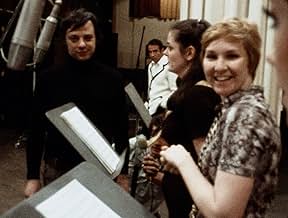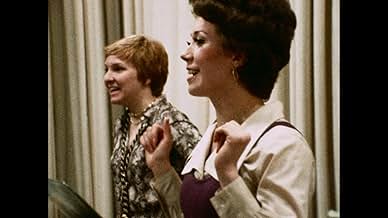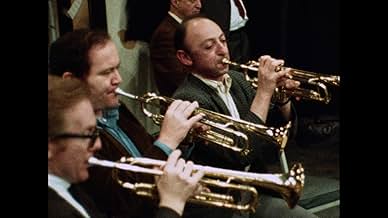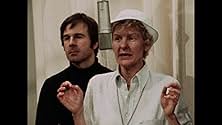Original Cast Album: Company
- 1970
- 53m
ÉVALUATION IMDb
8,0/10
1,2 k
MA NOTE
Ajouter une intrigue dans votre langue"Company" musical's original cast recording session filmed by D.A. Pennebaker in 1970. Captures interactions between Sondheim, performers and live recording process, culminating with Elaine ... Tout lire"Company" musical's original cast recording session filmed by D.A. Pennebaker in 1970. Captures interactions between Sondheim, performers and live recording process, culminating with Elaine Stritch's iconic "The Ladies Who Lunch" rendition"Company" musical's original cast recording session filmed by D.A. Pennebaker in 1970. Captures interactions between Sondheim, performers and live recording process, culminating with Elaine Stritch's iconic "The Ladies Who Lunch" rendition
Thomas Z. Shepard
- Self (record producer)
- (as Thomas Z. Shepherd)
Avis en vedette
I memorized this soundtrack and could sing along with every song before I ever saw the play. In the many years since, I try to see this production whenever it appears...such a fun Sondheim musical. Nobobdy will ever compare to Elaine Strich's vocals on the album as a jaded, oft married, oft divorced friend of Bobby's. She is wonderful. Another great number is "Barcelona", when Bobby beds numerous airline stewardesses... very clever. Listen and enjoy!
A good problem I suppose to have is that at 53 minutes, this is much too brief a look at a part of the process in Theatre that gets underappreciated as far as when the cast of a production makes the recording for the album to go out into the world - in other words, as one of the cast briefly describes in one of the handful of interviews here (being Pennebaker its 98% Verite and 2% usual doc), when you're dancing and singing you do it once and it goes by so fast, where on record it's difficult sometimes to get that same energy up in live performance. It is worth noting this was a Pilot for a proposed series of documentaries showing the creative process with Broadway shows, and as happens sometimes the exec who green-lit the first one moved on and it was cancelled, so we all are lucky this exists as is at all.
What makes this so remarkable and indelible is precisely that you don't have to have seen the actual show of Company to get the gist (I certainly hadn't, my extent of familiarity was with the Documentary Now sketch and I'm sure many my age who aren't Theater Kids will be the same way coming to this after Sondheim's passing and may his life be a blessing etc). You can pick up quickly this is a biting black comedy about marriage and relationships, what it means to become married or about to get married or not get married (the one song where the woman is talking like a guy at an auction is incredible, no one you or I know could do that), and even when there's sincerity to the music and lyrics there's this razor's edge that Sondheim is dealing with - West Side Story in many places was the same- where the earnestness could go too far but is saved by the knowingness of how people act and relate in a society, and you must have humor with the heart.
And while it's thrilling to see the performers do these songs, in what may be the first or the tenth of many takes and this process is buoyed by Sondheim and the playwright and record producer finding what works on an equal footing with what doesn't or what needs so tweaks (like oh no you were in A and not F for this time dang), I love everything in the control booth and wonder if Pennebaker had even more footage of that and if so there could be a longer cut. Again his great tact as a filmmaker, like the contemporaneous Maysles Brothers and Charlotte Zwerin, was to manage to get so much on record without making anyone self conscious or notice the camera was there (or if they are aware of it they don't make it so known that it takes us out of it).
But then we get to Elaine Stritch and that last ten minutes or so when she tries to do the "Lunch" number and it's hard not to feel your heart kind of break... more for the creatives than for her who watch a take that even if we don't know it ahead of time that she has to go again can feel that she must since this is a take at the end of a long day (as a filmmaker I've been there, believe me, especially the frustration of wanting to make it work so badly).
The producer is up front with what's not working (the word facile or flaccid comes up I forget which), and meanwhile Stephen in that turtleneck and on the edge of two sides of ecstasy or chronic dissatisfaction buries his face in his arm in grief over this take. And it's not like he wants it that way but rather its the theme throughout throughout documentary: how do you not only get something to be Good but to go *Beyond* it and capture that spontaneity of a theatrical performance?
This film will always be a tribute to the satirical wit and musical glory that was Sondheim, but also how strong Pennebaker could be in his own element (again see how simply he or his cameraman move around the one singer from behind in that one performance, beautiful). Highlights include: "Getting Married Today" (with that ten words every two seconds part), "Another Hundred People" "Being Alive" (ok I get Marriage Story now), and "Barcelona.
What makes this so remarkable and indelible is precisely that you don't have to have seen the actual show of Company to get the gist (I certainly hadn't, my extent of familiarity was with the Documentary Now sketch and I'm sure many my age who aren't Theater Kids will be the same way coming to this after Sondheim's passing and may his life be a blessing etc). You can pick up quickly this is a biting black comedy about marriage and relationships, what it means to become married or about to get married or not get married (the one song where the woman is talking like a guy at an auction is incredible, no one you or I know could do that), and even when there's sincerity to the music and lyrics there's this razor's edge that Sondheim is dealing with - West Side Story in many places was the same- where the earnestness could go too far but is saved by the knowingness of how people act and relate in a society, and you must have humor with the heart.
And while it's thrilling to see the performers do these songs, in what may be the first or the tenth of many takes and this process is buoyed by Sondheim and the playwright and record producer finding what works on an equal footing with what doesn't or what needs so tweaks (like oh no you were in A and not F for this time dang), I love everything in the control booth and wonder if Pennebaker had even more footage of that and if so there could be a longer cut. Again his great tact as a filmmaker, like the contemporaneous Maysles Brothers and Charlotte Zwerin, was to manage to get so much on record without making anyone self conscious or notice the camera was there (or if they are aware of it they don't make it so known that it takes us out of it).
But then we get to Elaine Stritch and that last ten minutes or so when she tries to do the "Lunch" number and it's hard not to feel your heart kind of break... more for the creatives than for her who watch a take that even if we don't know it ahead of time that she has to go again can feel that she must since this is a take at the end of a long day (as a filmmaker I've been there, believe me, especially the frustration of wanting to make it work so badly).
The producer is up front with what's not working (the word facile or flaccid comes up I forget which), and meanwhile Stephen in that turtleneck and on the edge of two sides of ecstasy or chronic dissatisfaction buries his face in his arm in grief over this take. And it's not like he wants it that way but rather its the theme throughout throughout documentary: how do you not only get something to be Good but to go *Beyond* it and capture that spontaneity of a theatrical performance?
This film will always be a tribute to the satirical wit and musical glory that was Sondheim, but also how strong Pennebaker could be in his own element (again see how simply he or his cameraman move around the one singer from behind in that one performance, beautiful). Highlights include: "Getting Married Today" (with that ten words every two seconds part), "Another Hundred People" "Being Alive" (ok I get Marriage Story now), and "Barcelona.
This documentary is done after the Broadway premiere of the original production of the musical, "Company," by Stephen Sondheim and directed by Harold Prince. Anyway if you've listened to the soundtrack or have seen a stage production, you will find this behind the scenes at the recording studio where they belt out the numbers from the production to be quite interesting. You can't help but love and admire Elaine Stritch who is a Broadway veteran and legend. She may not have the best voice but her "Ladies That Lunch" is memorable and a battle at the studio. You can't help but like Elaine, Stephen, Harold or Hal, and even Howard Furth who wrote the book. They and the other cast members which included Beth Howland (before TV's Alice as Vera) and her partner/husband Charles Kimbrough (long before TV's Murphy Brown as Jim Dial) along with other cast members like veteran stage actress Donna McKechnie. They all do a fabulous job in displaying why people pay to see them perform when it was more affordable as it is now. Sometimes, a good musical doesn't have to wow you as much or have special effects. Sometimes, reality can make a pretty good show.
10gosnellb
This one is for musical comedy fans only, but if you are, this somewhat mythic documentary will remind you why you love them so much.
Watching Sondheim at work, correcting the pronunciation of Bobby, Bubby (booby) Bobby Bob is worth the price of admission.
I've waited years to watch this and finally Netflix made it possible.
A month later, I watched the PBS screening of the John Doyle revival of Company. Since it won a Tony, I expected a decent show though I knew Doyle had staged it with his three-time gimmick, the performers playing their own instruments. (When I heard he was directing "Peter Grimes" at the Met, my first thought was how on earth the opera singers were going to manage to play their own instruments.
Not that I didn't care for the new Company, but I couldn't believe anyone on the planet earth would want to be friends with anyone of those people. They were unlikable, unsympathetic and wore incredibly ugly costumes. No dancing, of course, since you can't play an instrument and dance but there was the marching band doing What Would We Do Without You, which sort of worked. You Could Drive a Person Crazy was sort of cute, with them stopping to blow saxophones rather than do the Do-do-dododo part.
Amy had none of the whimsy that makes "I'm Not Getting Married Today" work. In fact, this Amy looked old and hard.
Joanne, however, had not a whit of the charm Elaine Stritch brought to the part. She seemed to mistake off key for acerbic and walking around playing the triangle just didn't work for me.
Maybe it's hard to be picky about a cast when they all have to play an instrument. What a stupid way to cast a musical comedy. Doyle seems to forget it's a musical.
So rent the Making Of because it truly captures the musical. And listen to the commentary. It's priceless. Once you know what Dean Jones was going through, his "Being Alive" is heart wrenching.
Watching Sondheim at work, correcting the pronunciation of Bobby, Bubby (booby) Bobby Bob is worth the price of admission.
I've waited years to watch this and finally Netflix made it possible.
A month later, I watched the PBS screening of the John Doyle revival of Company. Since it won a Tony, I expected a decent show though I knew Doyle had staged it with his three-time gimmick, the performers playing their own instruments. (When I heard he was directing "Peter Grimes" at the Met, my first thought was how on earth the opera singers were going to manage to play their own instruments.
Not that I didn't care for the new Company, but I couldn't believe anyone on the planet earth would want to be friends with anyone of those people. They were unlikable, unsympathetic and wore incredibly ugly costumes. No dancing, of course, since you can't play an instrument and dance but there was the marching band doing What Would We Do Without You, which sort of worked. You Could Drive a Person Crazy was sort of cute, with them stopping to blow saxophones rather than do the Do-do-dododo part.
Amy had none of the whimsy that makes "I'm Not Getting Married Today" work. In fact, this Amy looked old and hard.
Joanne, however, had not a whit of the charm Elaine Stritch brought to the part. She seemed to mistake off key for acerbic and walking around playing the triangle just didn't work for me.
Maybe it's hard to be picky about a cast when they all have to play an instrument. What a stupid way to cast a musical comedy. Doyle seems to forget it's a musical.
So rent the Making Of because it truly captures the musical. And listen to the commentary. It's priceless. Once you know what Dean Jones was going through, his "Being Alive" is heart wrenching.
It's impressive to watch a gaggle of Broadway's best, at almost the exact moment the clock moved from the 1960s into the '70s, take their places in a featureless recording studio to make history. The original cast, the orchestra players, the sound engineers, composer Stephen Sondheim, and session producer Thomas Shepard demonstrate more than great talent and love for what they're doing. They give a master class in how to listen, how to give and take direction, how to hit the creators' target. Near the end, when Ms. Stritch belts out a solo for the ages at 3 a.m., the producer criticizes her delivery, and I wanted to smack him! But I'm not a theater person, unlike the phenomenal troupers who kept soaking up instructions and doing more, more, more takes till everyone was happy. They did it right.
If you own any original cast recording of a Broadway musical, I recommend this behind-the-scenes look at how one OCR was made.
If you own any original cast recording of a Broadway musical, I recommend this behind-the-scenes look at how one OCR was made.
Le saviez-vous
- GaffesIn the opening scroll, thanks is given to the office of "David Suskind". It is actually David Susskind.
- ConnexionsFeatured in Aquarius: Company (1972)
Meilleurs choix
Connectez-vous pour évaluer et surveiller les recommandations personnalisées
Détails
Contribuer à cette page
Suggérer une modification ou ajouter du contenu manquant


